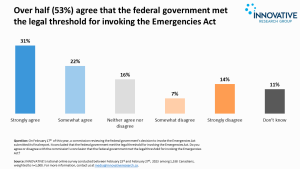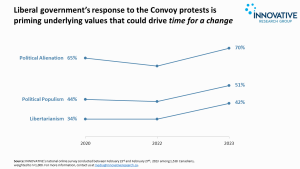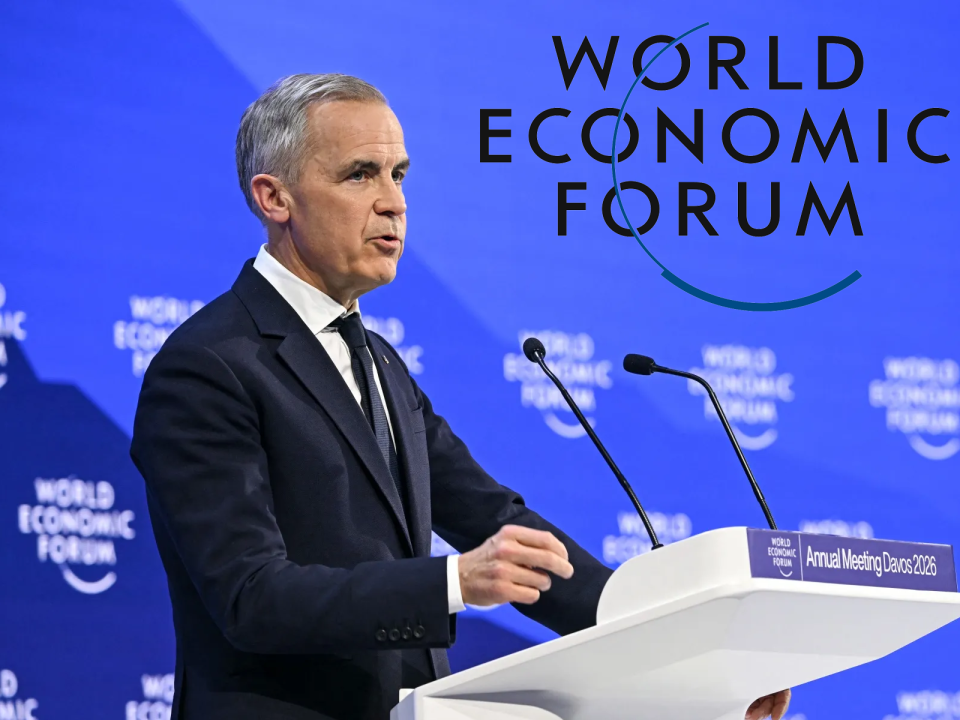

A new INNOVATIVE poll on public reaction to the Public Order Emergency Commission’s decision shows that Canadians’ opinions on the conclusion of the commission are framed by the same underlying attitudes that drove their reaction to the Convoy:
- Views on mandatory vaccinations,
- Libertarianism,
- Political alienation, and
- Populism
On February 14th, 2022, the federal government invoked the Emergencies Act to deal with protests by truckers across the country. The decision was revoked nine days later. A commission reviewing the government’s decision submitted its final report on February 17th, 2023, concluding that the government met the legal threshold for invoking the Emergencies Act.
A February poll conducted by INNOVATIVE asked 1,358 Canadians how closely they have been following the news about the federal government’s decision to invoke the Emergencies Act, whether they support or oppose the decision to invoke the Emergencies Act, and whether they agree or disagree with the commission’s conclusion that the federal government met the legal threshold for invoking the Emergencies Act. The report compares Canadians who agree with the commission to those who oppose it across a range of attitudes related to COVID-19 and psychographic values to see if the factors that divided Canadians on the Convoy protest are still meaningful today. The results are weighted to 1,000 by age, gender, region, and party identification to ensure that the overall sample’s composition reflects that of the actual population according to Census data. A detailed methodology is provided in the report.
A majority of respondents have been following the news about the federal government’s decision to invoke the Emergencies Act at least somewhat closely, although a public interest in the issue is declining. As memories of the Freedom Convoy fade, fewer people are following news about the Emergencies Act very closely today (18%) than they did when it was invoked (30%).
Exactly half of respondents support the decision to invoke the Emergencies Act, while only 23% oppose. While support is stable, the share of those who strongly oppose the decision is down 8 points from 24% to 16%. About half (53%) also agree with the commission’s conclusion that the federal government met the legal threshold for invoking the Emergencies Act. Only 20% oppose, highest among Conservatives (45%).
The poll found that the same core attitudes that defined support and opposition to the Freedom Convoy also defined agreement or disagreement with the commission’s conclusion. These are:
- Attitude towards vaccine mandates: Those who strongly agree with the commission are strong supporters of vaccine mandates, while those who strongly disagree are strongly opposed to mandates.
- Libertarianism: 4-in-5 (78%) of those who strongly oppose the commission strongly agree that most things would run pretty well without any government involvement.
- Political alienation: 9-in-10 (89%) of those who strongly oppose the commission agree that the government cares more about special interest than it does about the average person.
- Political populism: 4-in-5 (81%) of those who strongly oppose the commission believe that too often, the government listens to experts instead of common sense.
It is also important to note that these drivers of opposition have been growing over time.

The decision to invoke the Emergencies Act and the subsequent response by the Liberal government to the Convoy protests have had a significant impact on Canadian society. While the majority may support the decision and the commission’s conclusion, it is clear that the Liberal government’s response to the Convoy protests is priming underlying values that could drive time for a change, including values such as libertarianism, political alienation, and political populism. Some of these values create vulnerability among younger people who have been an important part of the Liberal base.
It may be that Liberal government is winning the battle but losing the war.


































